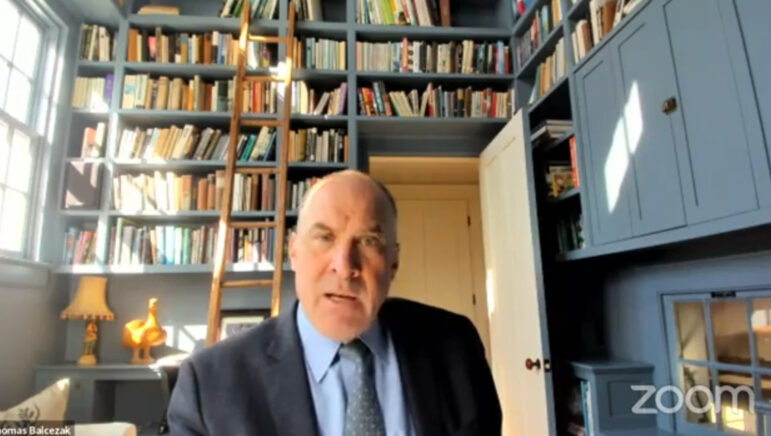Wednesday will mark the two year anniversary of Yale New Haven Health System’s first Covid patient admission, which was at Bridgeport Hospital.
At a press conference Tuesday, chief medical officer Dr. Tom Balcezak said about 21,000 Covid patients had been treated and discharged, land all but 1,700 were discharged safely and healthy back home, though some do still have long Covid.

Back in December, there was a five-fold increase in the number of Covid-positive hospitalizations. The rise to 513 on the last day of the month, versus 100 at the beginning of the month reflected the impact of Omicron variant.
Marna Borgstrom, CEO of the Health System, said as recently as mid-January there were 767 patients across the system.
On Tuesday there were just 58 in, including 7 patients in the ICU and 3 on ventilators.
“That’s a pretty remarkable turnaround,” she said. “Unlike previous variants, this one had a pretty meteoric rise and fell quite precipitously. I think back to the time when we were counting our ventilators and hoping we had enough.”
Breakdown of the 58 patients being treated for Covid on Tuesday:
2 at Greenwich Hospital
33 at Yale New Haven Hospital
17 at Bridgeport Hospital
6 at Lawrence + Memorial Hospital
0 at Westerly Hospital in Rhode Island
Asked about Florida surgeon general Dr. Joseph Ladapo’s recommendation that “healthy” children not get Covid-19 vaccines, Balcezak said, “Any time there is a statement made like that that does not have its origins, roots or backing data, I think it undermines our efforts to give the public good guidance. The challenge in the pandemic has been trying to give people good guidance with very little data and constantly evolving information.”
“The statement by the surgeon general is actually against existing data,” he continued. “There is a difference between giving advice when you don’t know the answer and giving false advice when the answer is known…We know that the vaccine works in children. We know it works to prevent the spread of disease. So I don’t understand the logic in that case.”
Dr. Balcezak said nasal vaccines were at least 6 months to a year away.
“We have some experience with nasal vaccines with influenza,” he said. “They work very well with the flu. The hope is that if you give a nasal vaccine you can sort of ‘prime the immune system’ in the mucus membranes in your nose …where the Covid virus enters your body, and neutralize it at the point of entry rather than wait until it gets into your body and replicates, and then neutralize it in your blood stream.”
“The thought is it may be able to catch the virus ‘upstream,’ before it gets a foothold in your body,” he said.
On the topic of a possible fourth dose (on top of two vaccines plus a booster), Balcezak said immunity may last 6 months to a year, and that there would probably be recommendations later this summer or early in the fall for another dose, depending on studies of longstanding immunity and case rates.
In future, he said it is likely there will be a time when Covid will become cyclical, and an annual booster available like there is for flue.
Asked about the impact of two years of the pandemic on behavioral health, Dr. Balcezak said there had been a huge demand for behavioral health services, both in pediatric and adult patients.
“And, we’ve offered enhanced support and counseling to our own employees,” Balcezak said. “We’ve seen a big uptick in employees seeking help. I think everyone is under enormous pressure and strain, and that has manifested itself in a lot of behavioral health challenges across our populations – not just uniquely among children.”
While mask mandates have been dropped across the state, Dr. Balcezak said there was still a federal mandate to mask in healthcare environments.
“We’ve been talking about what it might look like if we begin to allow in off-campus, non healthcare settings our staff to choose whether to mask or not,” he said.
In large crowded settings, Balcezak said that personally he felt more comfortable wearing a mask.
“We’re not only protecting ourselves, but we’re protecting each other because masks are a two-way street,” he said. ”
Chris O’Connor, Yale New Haven Health System President, said the health system is responding to the massive and horrifying incursion of Russia into Ukraine.
“To provide some small comfort and assistance, the Health System will be donating more than $1 million in medical supplies to the people of Ukraine as they endure this hostile invasion,” O’Connor said. “We will continue to watch and assess what we can do in the face of this international disaster.”
Donated items will include surgical masks, gowns and N95 masks to help caregivers in Ukraine.
O’Connor said access had been a challenge, but the system selected a reputable agency to distribute the supplies.